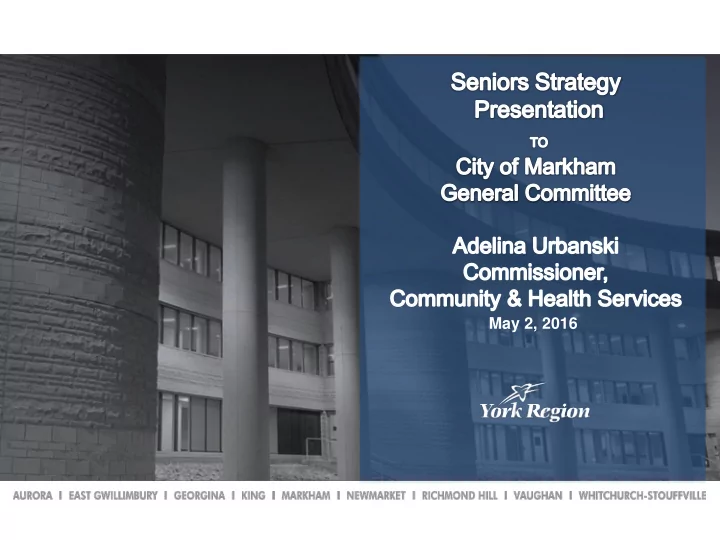

May 2, 2016
Developing the Seniors Strategy Phase III (2017) Strategy Phase I (2012-15) Implementation Strategy Foundation Develop institutional framework to achieve Understand the results; culture shift, current issues identification of action Research, data plans, partners, collection, trend performance measures, identification and priorities and analysis implement changes Phase II (2015-16) Strategy Development Phase IV (Ongoing) Define appropriate role serving seniors Monitoring and Evaluation Identify priorities and results Regular Reporting Regional Council Report Continuous improvement Fall 2016 activities to better meet expected 2 outcomes
Seniors Strategy Advisory Task Force Membership Regional Council Members Regional Chair, Emmerson, ex-officio Regional Councillor Armstrong, City of Markham Regional Councillor Ferri (Chair), City of Vaughan Mayor Hackson, Town of East Gwillimbury Regional Councillor Heath, City of Markham Regional Councillor Hogg (Vice Chair), Town of Richmond Hill Regional Councillor Rosati, City of Vaughan Regional Councillor Wheeler, Town of Georgina 3
Task Force Deliverables 1. Recommendations for Regional Council consideration to develop a corporate Seniors Strategy – appropriate roles, policies and guiding principles 2. A decision making tool that will include criteria to determine the Region’s level of involvement in the delivery of programs and services to seniors 4
Overview of Government Funded Services for Seniors – A York Region Perspective Service System Map Broad Policy Health Care Housing and Staying Safe and Finances Transportation and Connected 5
Meetings at a Glance OCT. 22 DEC. 9 FEB. 24 APR. 8 JUN. 17 OCT. 2015 2015 2016 2016 2016 2016 Aging in Place Orientation The The Health Staying Wrap-up Session Lens Meeting Financial Safe and Lens Connected 6
Quest What is the Region’s role in serving seniors over the next 10 to 20 years – making the best use of resources, managing expectations, leveraging partnerships and responding to provincial direction? 7
What We Heard Orientation Session OCT. 22 2015 Respond to Understand Anticipate Community Sustainability Region’s Role who does what outcomes Issues Municipal Advocacy Set Principles Prevention Partnerships System Access Partners The Financial Lens DEC. 9 2015 Consider income Can’t invest in Services available Obligation to help Intergenerational and assets – one generation based on ability those who really Best practices equity asset rich – at the expense to pay vs. age need it cash poor of another Education – plan Generational Financial Prefer to stay in Financial literacy and save for Sustainability attitude shifts own home retirement 8
What We Heard The Health Lens FEB. 24 Hospital Care 2016 $$$$ Invest more in Long Term Care Improve access Falls are leading Seniors prefer to home care and $$$ and awareness cause of injury community Age in Place Home and of services for seniors supports Community Care $$ Expand More Having one voice Healthy aging is prevention Demand for complex care Age Friendly to advocate key to aging in programs and LTC beds will = Communities for change place promote healthy outpace supply More aging staff training Aging in Place APRIL 8 Importance of Finding ways to Need for a Partnering with 2016 Looking at new building the Local stretch the variety of Complete care models Municipalities dollars housing options, Communities Collaborate to Life changes Co- locate and Develop new Mixed Use System keep people in impact housing Coordinate eligibility Communities Navigation their homes needs Services models 9
Potential Emerging Action Areas Task Force Principles Action Area Evidence Based Decision Making Develop a Capacity Plan for York Region • determination of resource requirements to meet need Evidence Based Decision Making Identify a Senior Hub Model Partnerships, Alignment, Collaboration Partnerships, Alignment, Collaboration Coordinate and Connect Discussions (Planning Together) • Transit providers for seniors (MOHLTC, MTO) • York University – Fear of Falling Research • Federation of Canadian Municipalities (add seniors to agenda) • Association of Municipalities of Ontario (add seniors to agenda) • National Institute on Aging – Ryerson (GTA Network) • Local municipalities Partnerships, Alignment, Collaboration Explore Age Friendly Communities Concept Education Education Staff Training • to enable staff to support senior ’ s changing needs Education Increase Awareness of Services for Seniors • systems are easy to navigate , information coordination Prevention Expanding Prevention Programs • i.e . Community Paramedicine, Public Health Respond Based on Financial Need and Develop an Ability to Pay Model Ability to Pay • based on income and assets 10
Potential Emerging Advocacy Areas Task Force Principles Advocacy Area Linkages Evidence -Based Decision Making Capacity Planning for Long Term Care Beds Provincial Government Central LHIN in Ontario • determine the amount of resources required including the number of beds, location, type Prevention Expanding Public Health Mandate Public Health Agency Education of Canada for Seniors Provincial Government • promoting healthy aging Central LHIN • prevention opportunities Prevention Federal Government Funding for Home and Partnerships, Collaboration Provincial Government Community Care Supports and Alignment Central LHIN • Unionville hub model , HYI Seniors Buildings Fiscal Sustainability and Balance Infrastructure Funding for Federal Government Provincial Government Housing Services • link to social housing Financial Need and Ability to Pay Federal Government Pension Reform • OAS, CPP Supplement 11
Next Steps • Consultations (May-August 2016) – Staff engagement – Stakeholder consultations • Targeted organizations serving seniors • Seniors groups • Task Force Wrap Up Meeting - hear the feedback (Oct 2016) • Recommendations to Regional Council 12
Where we might work together…. 1. Conducting Consultations – Seniors groups – Key stakeholders serving seniors (i.e. local municipal staff ) 2. Co-locating services i.e. satellite recreation services in Seniors Housing Buildings 3 . Developing a Seniors Hub Model i.e. Unionville project 4 . Explore Age Friendly Communities Concept i.e. understanding gaps, opportunities and roles 13
Recommend
More recommend